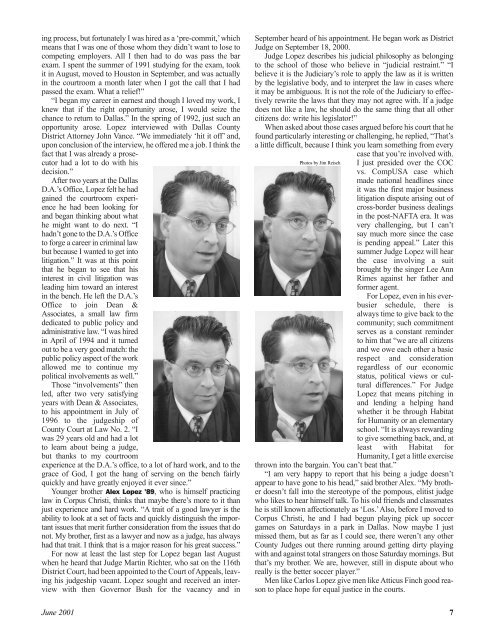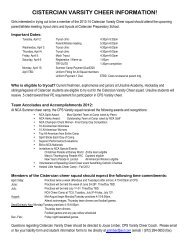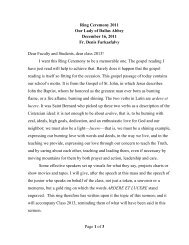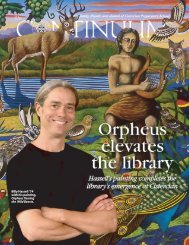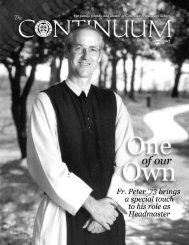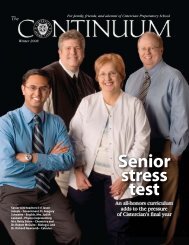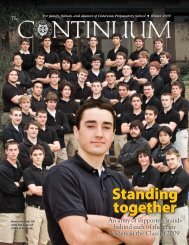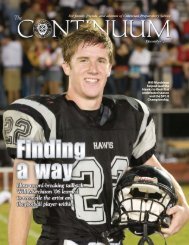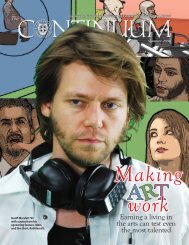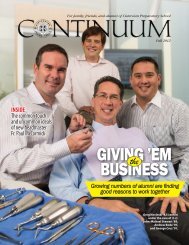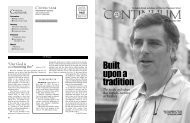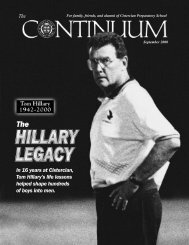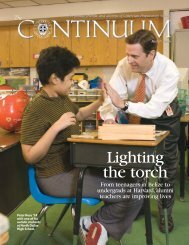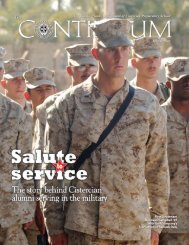Sitting the Bench - Cistercian Preparatory School
Sitting the Bench - Cistercian Preparatory School
Sitting the Bench - Cistercian Preparatory School
You also want an ePaper? Increase the reach of your titles
YUMPU automatically turns print PDFs into web optimized ePapers that Google loves.
ing process, but fortunately I was hired as a ‘pre-commit,’which<br />
means that I was one of those whom <strong>the</strong>y didn’t want to lose to<br />
competing employers. All I <strong>the</strong>n had to do was pass <strong>the</strong> bar<br />
exam. I spent <strong>the</strong> summer of 1991 studying for <strong>the</strong> exam, took<br />
it in August, moved to Houston in September, and was actually<br />
in <strong>the</strong> courtroom a month later when I got <strong>the</strong> call that I had<br />
passed <strong>the</strong> exam. What a relief!”<br />
“I began my career in earnest and though I loved my work, I<br />
knew that if <strong>the</strong> right opportunity arose, I would seize <strong>the</strong><br />
chance to return to Dallas.” In <strong>the</strong> spring of 1992, just such an<br />
opportunity arose. Lopez interviewed with Dallas County<br />
District Attorney John Vance. “We immediately ‘hit it off’ and,<br />
upon conclusion of <strong>the</strong> interview, he offered me a job. I think <strong>the</strong><br />
fact that I was already a prosecutor<br />
had a lot to do with his<br />
decision.”<br />
After two years at <strong>the</strong> Dallas<br />
D.A.’s Office, Lopez felt he had<br />
gained <strong>the</strong> courtroom experience<br />
he had been looking for<br />
and began thinking about what<br />
he might want to do next. “I<br />
hadn’t gone to <strong>the</strong> D.A.’s Office<br />
to forge a career in criminal law<br />
but because I wanted to get into<br />
litigation.” It was at this point<br />
that he began to see that his<br />
interest in civil litigation was<br />
leading him toward an interest<br />
in <strong>the</strong> bench. He left <strong>the</strong> D.A.’s<br />
Office to join Dean &<br />
Associates, a small law firm<br />
dedicated to public policy and<br />
administrative law. “I was hired<br />
in April of 1994 and it turned<br />
out to be a very good match: <strong>the</strong><br />
public policy aspect of <strong>the</strong> work<br />
allowed me to continue my<br />
political involvements as well.”<br />
Those “involvements” <strong>the</strong>n<br />
led, after two very satisfying<br />
years with Dean & Associates,<br />
to his appointment in July of<br />
1996 to <strong>the</strong> judgeship of<br />
County Court at Law No. 2. “I<br />
was 29 years old and had a lot<br />
to learn about being a judge,<br />
but thanks to my courtroom<br />
experience at <strong>the</strong> D.A.’s office, to a lot of hard work, and to <strong>the</strong><br />
grace of God, I got <strong>the</strong> hang of serving on <strong>the</strong> bench fairly<br />
quickly and have greatly enjoyed it ever since.”<br />
Younger bro<strong>the</strong>r Alex Lopez ’89, who is himself practicing<br />
law in Corpus Christi, thinks that maybe <strong>the</strong>re’s more to it than<br />
just experience and hard work. “A trait of a good lawyer is <strong>the</strong><br />
ability to look at a set of facts and quickly distinguish <strong>the</strong> important<br />
issues that merit fur<strong>the</strong>r consideration from <strong>the</strong> issues that do<br />
not. My bro<strong>the</strong>r, first as a lawyer and now as a judge, has always<br />
had that trait. I think that is a major reason for his great success.”<br />
For now at least <strong>the</strong> last step for Lopez began last August<br />
when he heard that Judge Martin Richter, who sat on <strong>the</strong> 116th<br />
District Court, had been appointed to <strong>the</strong> Court of Appeals, leaving<br />
his judgeship vacant. Lopez sought and received an interview<br />
with <strong>the</strong>n Governor Bush for <strong>the</strong> vacancy and in<br />
June 2001<br />
September heard of his appointment. He began work as District<br />
Judge on September 18, 2000.<br />
Judge Lopez describes his judicial philosophy as belonging<br />
to <strong>the</strong> school of those who believe in “judicial restraint.” “I<br />
believe it is <strong>the</strong> Judiciary’s role to apply <strong>the</strong> law as it is written<br />
by <strong>the</strong> legislative body, and to interpret <strong>the</strong> law in cases where<br />
it may be ambiguous. It is not <strong>the</strong> role of <strong>the</strong> Judiciary to effectively<br />
rewrite <strong>the</strong> laws that <strong>the</strong>y may not agree with. If a judge<br />
does not like a law, he should do <strong>the</strong> same thing that all o<strong>the</strong>r<br />
citizens do: write his legislator!”<br />
When asked about those cases argued before his court that he<br />
found particularly interesting or challenging, he replied, “That’s<br />
a little difficult, because I think you learn something from every<br />
case that you’re involved with.<br />
Photos by Jim Reisch<br />
I just presided over <strong>the</strong> COC<br />
vs. CompUSA case which<br />
made national headlines since<br />
it was <strong>the</strong> first major business<br />
litigation dispute arising out of<br />
cross-border business dealings<br />
in <strong>the</strong> post-NAFTA era. It was<br />
very challenging, but I can’t<br />
say much more since <strong>the</strong> case<br />
is pending appeal.” Later this<br />
summer Judge Lopez will hear<br />
<strong>the</strong> case involving a suit<br />
brought by <strong>the</strong> singer Lee Ann<br />
Rimes against her fa<strong>the</strong>r and<br />
former agent.<br />
For Lopez, even in his everbusier<br />
schedule, <strong>the</strong>re is<br />
always time to give back to <strong>the</strong><br />
community; such commitment<br />
serves as a constant reminder<br />
to him that “we are all citizens<br />
and we owe each o<strong>the</strong>r a basic<br />
respect and consideration<br />
regardless of our economic<br />
status, political views or cultural<br />
differences.” For Judge<br />
Lopez that means pitching in<br />
and lending a helping hand<br />
whe<strong>the</strong>r it be through Habitat<br />
for Humanity or an elementary<br />
school. “It is always rewarding<br />
to give something back, and, at<br />
least with Habitat for<br />
Humanity, I get a little exercise<br />
thrown into <strong>the</strong> bargain. You can’t beat that.”<br />
“I am very happy to report that his being a judge doesn’t<br />
appear to have gone to his head,” said bro<strong>the</strong>r Alex. “My bro<strong>the</strong>r<br />
doesn’t fall into <strong>the</strong> stereotype of <strong>the</strong> pompous, elitist judge<br />
who likes to hear himself talk. To his old friends and classmates<br />
he is still known affectionately as ‘Los.’Also, before I moved to<br />
Corpus Christi, he and I had begun playing pick up soccer<br />
games on Saturdays in a park in Dallas. Now maybe I just<br />
missed <strong>the</strong>m, but as far as I could see, <strong>the</strong>re weren’t any o<strong>the</strong>r<br />
County Judges out <strong>the</strong>re running around getting dirty playing<br />
with and against total strangers on those Saturday mornings. But<br />
that’s my bro<strong>the</strong>r. We are, however, still in dispute about who<br />
really is <strong>the</strong> better soccer player.”<br />
Men like Carlos Lopez give men like Atticus Finch good reason<br />
to place hope for equal justice in <strong>the</strong> courts.<br />
7


